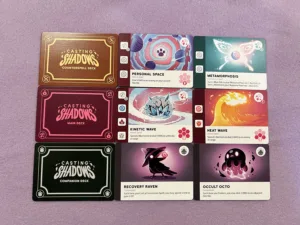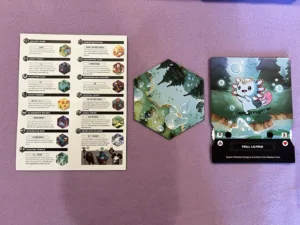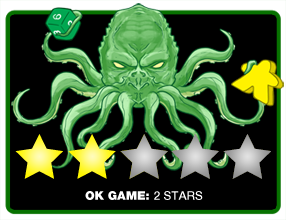 I’m going to be a little bit vulnerable and make a confession here: I will play any game that includes an axolotl. Those weird and wiggly little water lizards with frilly gills and no thoughts behind their eyes? They’ve captured both my soul and my wallet. First, they sold me on Everdell: Pearlbrook, with its little pink axolotl meeples. Then I pulled the trigger on Casting Shadows by Unstable Games even before glancing at the rulebook. I saw the axolotls and went into a daze.
I’m going to be a little bit vulnerable and make a confession here: I will play any game that includes an axolotl. Those weird and wiggly little water lizards with frilly gills and no thoughts behind their eyes? They’ve captured both my soul and my wallet. First, they sold me on Everdell: Pearlbrook, with its little pink axolotl meeples. Then I pulled the trigger on Casting Shadows by Unstable Games even before glancing at the rulebook. I saw the axolotls and went into a daze.
Were the character art previews that sold me as beautiful in the full game as they seemed? Definitely. Is the pretty axolotl art enough to save a deeply flawed game? Maybe not.
Gameplay Overview:
Casting Shadows is an area control game for 2-4 players. Each player selects one of the blindly cute warrior characters, each with its own abilities, and places it on their home tile. I obviously gravitate towards Frill the Regenerator, the axolotl that first caught my eye. The goal is to be the last player standing, casting spells to reduce your opponent’s health to zero.

On their turn, players roll to see which resources they will have at their disposal this round, and get four Action Points to spend how they choose. They may want to travel to another hex tile, reroll for better resources, spend resources to collect spells for their spell book, or cast spells that they’ve already acquired to take down their opponents. Each tile they travel to has special abilities that activate, which must be looked up on a separate rule sheet.
When a player accrues enough of the Shadow Fragment resources, they can transform their character from the adorable Base Form to the more powerful Shadow Form, strengthening their ability to deal damage to their opponents. The last character standing wins the game. There is an additional expansion that allows for 5-6 players.

Game Experience:
The cardinal sin of not printing the area effects directly onto the tiles is hard to recover from. It’s one of the clearest examples of overvaluing form over function in board game design that I’ve run into in a long time. This is especially egregious compared to the spell cards, which have an excellent visual layout and do a great job of telling you at a glance what resources are needed to purchase them.

The choice to preserve the tile art instead of guiding the players is a frustrating misstep that makes the game unpleasant to play and to teach. If this is your group’s favorite game and it comes out every game night, you’ll likely memorize the tile effects over repeated plays and never give the flimsy paper guide another thought. Everyone else will struggle to pass the small reference sheet around to look up the effects of every single movement. They could have at least included enough reference sheets for each player to have one of their own.
The tiles themselves are larger than necessary, making this game surprisingly sprawling. Likewise, the character cards are about twice the size they need to be to function. It feels as though the game was designed primarily to accommodate the sold separately deluxe vinyl figure components, dwarfing the standard wooden figures and creating a sea of unused space.

It is a pretty sea, though. Like Here to Slay and Happy Little Dinosaurs, the art is lively and fun. The characters and setting convey so much personality that they seem to tell their own story, a cartoon coming to life on the board while you play. Each character is squishably adorable in their Base Form, and beautiful in their cooler Shadow Form. The large number of spell cards and unpredictability of the dice rolls makes this a game that feels fresh across multiple replays.
This randomization can also result in a lack of balance, though. One character can easily jump out ahead after a lucky roll with no ability for their opponents to catch them up, or another character can roll nothing but curses several turns in a row leaving them frustrated with few turn options. It doesn’t matter how well you strategize if there’s no recourse for persistently poor rolling.
Final Thoughts:
Casting Shadows is a swing and a miss compared to other Unstable Games products. The art is phenomenal, and some players will enjoy the simplicity of the resource management and battle systems. Others will find it to be choppy and poorly balanced, with serious functionality issues.
Final Score: 2 Stars – The excellent art isn’t enough to save a deeply flawed game.
 Hits
Hits
• Lively, unique character art
• Clear and well-designed cards
Misses:
• Insufficient player reference materials
• Play becomes easily unbalanced.






















“I will play any game that includes an axolotl”
I’m the same way about penguins 😊